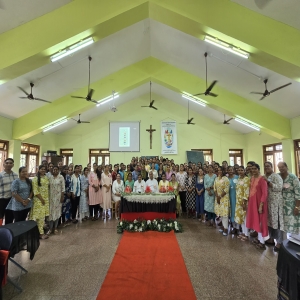
 Pachu Menon
Pachu Menon

The field of education is undergoing a metamorphosis — a change for the better, it is claimed!
The study of how knowledge is acquired, the methods used to impart it, and the policies that shape educational environments have always been under the radar of educators, who have long criticised the prevailing system of education.
But there has always been unanimity amongst most of them about moving beyond traditional models towards more dynamic, personalised, and technology-driven methods to educate students.
The apparent thrust on a learner-centric approach thus has umpteen methods being envisaged to make learning all the more easier for students to grasp new concepts and retain information.
However, any new teaching methodology will entail a thorough knowledge of the subject to be taught, with teachers required to be trained to gain hands-on experience with the novel techniques.
With the National Education Policy (NEP) strongly supporting new and innovative learning methods, a shift from rote learning to a more holistic and experimental approach would appear to be a natural sequence in the order of things.
In such an environment, it wouldn't be wrong to expect a multi-pronged approach to education, where innovation will play a significant role in imparting education and acquiring knowledge in the years to come.
But how beneficial is the whole gamut of 'betterments' that has come to describe the changing educational scenario for those for whom all this is being done?
Students are demonstrating varying degrees of success in adapting to the rapid changes in the education sector. While some individuals readily adopt new technologies and learning methods, others struggle to keep up. There is a need for ongoing support and innovative teaching strategies. This makes it even more evident that the vital link in the entire process is the teaching fraternity.
Teaching is a profession characterised by its responsibilities and the desire to inspire and nurture young minds. Hence, it is said that teaching is more of a passion than a profession. Effective teaching goes beyond simply delivering information.
The encouraging presence of individuals who have been beacons of hope for several young minds unable to grasp the intricacies of a new education 'regime'—which itself is mired in enough controversies of its own—has, however, opened up large vistas of learning.
The expansion of educational opportunities through innovative approaches has been the hallmark of Fr Gabriel Coutinho, a Goan Diocesan priest and the manager of Rosary High School, Navelim.
I have known Fr Gabriel since his days as the manager of St. Andrew's Institute, Vasco. His inherent understanding of how to effectively teach and share knowledge has consistently amazed me.
His ability to connect with learners, tailor their approach to different learning styles, and foster an environment conducive to learning sets him apart as a natural educator.
Hence, when I was informed that Rosary High School, Navelim, had taken the initiative in organising a three-day workshop in maths using activity-based, hands-on, and child-centric learning to enhance the quality and standards of primary education, I knew I couldn't miss it.
The sole objective of the workshop was to improve the teaching and learning of mathematics in schools, as well as to enhance understanding of fundamental mathematical concepts, while providing a strong foundation for learning through the 'Play-Way' Methodology, in line with the guidelines of NEP 2020.
As an educational approach that emphasises learning through play and hands-on activities, particularly in early childhood education, this method focuses on the child's natural curiosity and creativity to facilitate learning and development.
Quite contrary to the ambience one would generally associate with the venue of an educational workshop, the Cardinal Gracias Hall at Navelim, where the workshop was underway, wore a festive look.
The credit should go to the Headmistress of Rosary High School, Mrs Aurora D'Souza, who was an epitome of efficiency, marshalling her resources well and ensuring the smooth conduct of the event.
Teachers from 48 Diocesan schools, along with a few from government departments, attended 'EXPERIMATH,' which aimed to make learning mathematics fun for primary and upper primary students.
The active math-learning approach based on the ELPS pedagogy of 'Learning by Doing and Understanding' is an interesting and joyful process of hands-on experiences which simplifies math in a step-by-step manner by establishing meaningful associations between concrete experiences and abstract symbols, aided by a wide variety of materials, kits, games, and toys to play and learn.
The resource persons were from the 'Navnirmiti Eduquality Foundation,' Mumbai, a self-reliant social organisation that believes in the universalisation of effective education, with the motto 'Quality Education for Equality.'
The workshop, which focused on the theme of a comprehensive approach to teaching and learning mathematics at the elementary level, was engaging enough for everyone to attempt solving various arithmetic riddles in their own innovative ways.
But the startlingly simple ways the trainers arrived at solutions amazed one purely for the uncomplicatedness of the methods adopted.
Nevertheless, with education on the threshold of a new era where practical orientation, more than anything else, will help students easily grasp the subjects being taught, there is a need for those engaged in the field of imparting knowledge to be daring enough to innovate. But it all depends on the enterprising nature of the new corps of teachers!
'Experiments' with teaching methods need to transition from being periodic to one where there is consistency about them. It is all about the courage and conviction of dedicated teachers, which can tilt the balance in favour of a system that brings novelty and resourcefulness to teaching methods.
A 'Math Fair' envisaged somewhere in October this year is next on the cards, with plans afoot to rope in as many schools as possible to ensure maximum participation by students and teachers.
Fr Gabriel has set the ball rolling with such grand initiatives, which promise to change the face of elementary education in the state. We need more committed individuals like these who can revolutionise the very concept of learning and teaching.